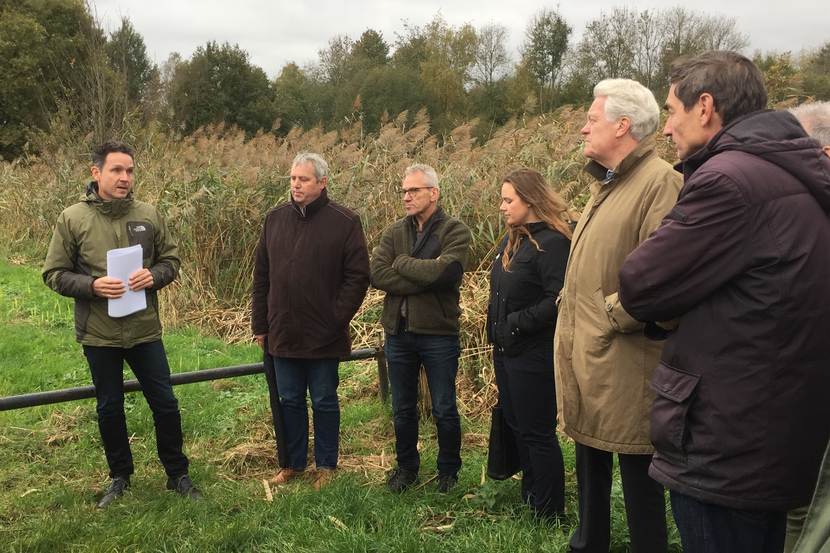Working visit to Climate-proof Land van Cuijk region
On 30 October, Delta Programme Commissioner Wim Kuijken paid a working visit to Land van Cuijk. In this region, five municipalities have joined forces with the district water board and the provincial authorities to prepare for waterlogging, drought, heat, and flooding: a pioneer in the field of climate adaptation. The Delta Programme Commissioner was brought up to date regarding the results, the issues that have come to the fore, and the plans for the period ahead, which include the construction of a water storage area.

Since 2014, the municipalities of Boxmeer, Cuijk, Grave, Sint Anthonis, and Mill & Sint Hubert have been collaborating with the Aa en Maas district water board and the province of Noord-Brabant to climate-proof the Land van Cuijk region. In 2015, a stress test was conducted covering the four issues of waterlogging, heat, drought, and flooding. The vulnerabilities that were identified have been compiled into an inspiration book, including potential solution strategies. Several actions have already been undertaken, such as climate workshops for municipal, provincial, and water board staff, and an inspirational field trip to Rotterdam. Local maps of climate opportunities have been drawn up, green-blue schoolyards have been constructed, and a garden greening campaign has been launched. A key element is communication. For example, an old portacabin has been converted into a “climate cabin” to be used during events or to inform schools about climate-proofing the region.
The working visit commenced in the castle of Tongelaar, located in the “Verborgen Raamvallei” area. On behalf of the partners present, Jos van den Boogaart (Alderman of Mill & Sint Hubert) exemplified the collaboration and the results of the Climate-proof Land van Cuijk project. He also addressed the plan to create room for water storage in the Verborgen Raamvallei area in order to prevent waterlogging in the urban environment. His presentation was followed by a visit to the future location of the weir that will enable water storage. Patrick Oomens (Aa en Maas district water board) indicated how residents and farms in the vicinity will be involved in the construction of the water storage area, and what arrangements have been made to take care of any damage caused by the construction.
Wim Kuijken: ‘I am very impressed by the Climate-proof Land van Cuijk project. We will certainly need to start preparing our country for weather extremes. You are showing us how, assisted by an eager project group. And by administrators who understand that solidarity is an important factor for success, when climate-proofing this region with its elevated and low-lying sections. Solidarity is essential when implementing a measure in the rural area in order to prevent waterlogging in the urban area. Creating flexibility in the spatial and water systems is another important element: reviewing step by step what needs to be done.’
Peter Ketelaars (Aa en Maas district water board member) finally thanked the Delta Programme Commissioner for the way in which he has substantiated collaboration within the Delta Programme in recent years, and for the national attention focused on the Elevated Sandy Soils.